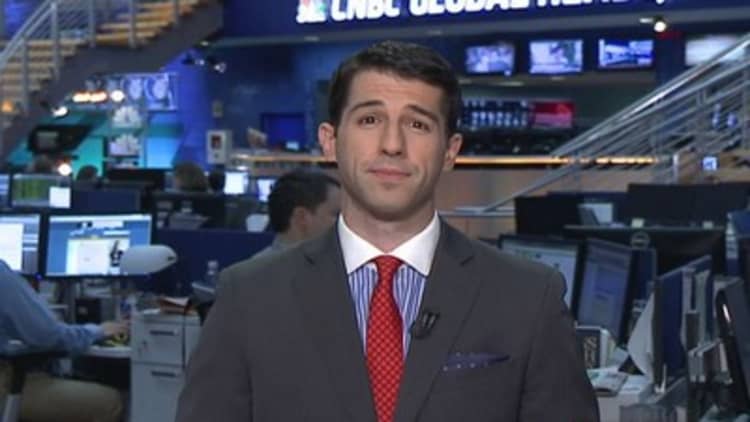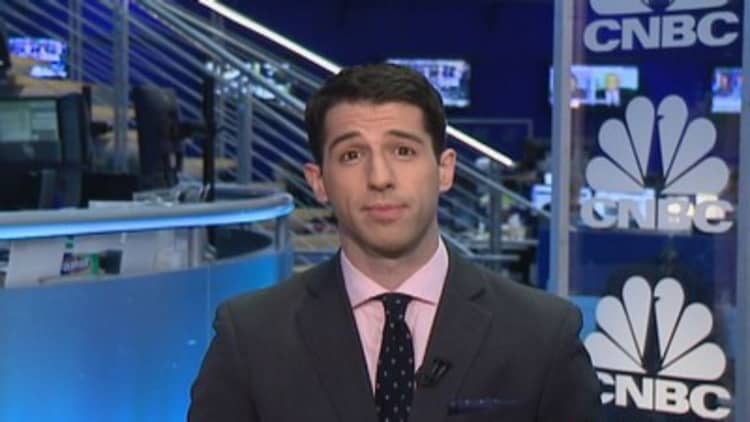
Tom Steyer's attempt to pick political fights over climate change appears to be working.
"Tom Steyer is an out-of-state, hyper-partisan, hedge-fund billionaire who is using his fortune to unseat Republicans he doesn't like," said Peter Steele, a spokesman for Steyer-target Paul LePage, the Maine governor who is running for re-election. "While liberal billionaires are trying to buy votes, the governor is focused on balancing environmental concerns with the need to attract businesses and increase career opportunities for middle-class Maine families."
Steyer's NextGen Climate advocacy group recently singled out LePage, claiming that he "denies that climate change is a threat."
LePage is one of seven political hopefuls targeted by Steyer, the retired founder of hedge fund Farallon Capital Management. He has pledged to spend at least $50 million of his own money and millions of dollars more from others for the cause. Besides Maine, he plans to play in midterm elections in Colorado, Florida, Iowa, Michigan, New Hampshire and Pennsylvania.
"The debate on climate change is settled: It is here, it is human-caused, and it is already having a devastating impact on our communities, but we need to accelerate the level of political support to address this critical issue before it's too late," Steyer said in a statement. "This means making politicians feel the heat—in their campaign coffers and at the polls."

Read MoreSteyer, Arnold and other big hedge funders go nonprofit
Steyer is among the most visible of wealthy financial industry donors ramping up their spending to influence political races set to culminate in November.
Financial industry firms and their employees—including commercial banks and investment groups like hedge and private equity fund managers—increased their political contributions in 2013 by 43.6 percent since 2009, the most recent pre-midterm election year.
"Contributions from Wall Street have dropped from last cycle but have risen significantly from the previous midterm elections," said Sheila Krumholz, executive director of the Center for Responsive Politics, which provided the data.
The financial industry gave $47.9 million in 2009, $99.4 million in 2011 and $68.9 million in 2013, according to non-partisan campaign finance disclosure tracker CRP. Wall Street's shift to more conservative candidates continues: Donors favored Republicans nearly 2 to 1, just like the last election cycle.
If Steyer is the financial world's most visible player on the left, Paul Singer is arguably its most important political funder on the right.
The founder of hedge fund firm Elliott Management has continued his political largess, writing large checks in 2014 to gay and lesbian rights group American Unity PAC ($1.75 million); debt- and budget-focused Ending Spending Action Fund ($350,000); pro-Republican political action committee American Crossroads ($250,000); the Republican National Committee ($32,400); and the National Republican Congressional Committee ($32,400), among others, according to Federal Election Commission records.
Singer has also supported Republican candidates directly this year, including North Carolina Senate hopeful Thom Tillis and Arizona U.S. House contender Martha McSally.
Like Steyer, Singer's support of McSally drew ire from her opponent, Ron Barber.
Ashley Nash-Hahn, a Barber campaign spokeswoman, recently named Singer as part of a small group of "high-rolling East Coast supporters" backing McSally.
"Martha McSally should spend less time pandering to ideological extremists and more time talking about her positions," Nash-Hahn said in a statement.
Singer's moves this year come after he already created a federal fundraising committee, Friends for an American Majority. The nascent group counts many prominent conservative hedge funders as supporters, such as Paulson & Co.'s John Paulson, AQR Capital Management's Cliff Asness and Citadel's Ken Griffin.
A spokesman for Singer declined to comment.
There are plenty of others from the hedge fund community giving big this year.
Top Wall Street political donors: hedge funds, private equity & banks
| Rank | Organization | Amount | Political leaning |
|---|---|---|---|
| 1 | American Bankers Association | $1,344,400 | GOP |
| 2 | Elliott Management | $1,143,073 | GOP |
| 3 | Wells Fargo | $1,000,239 | GOP |
| 4 | JPMorgan Chase | $919,975 | GOP |
| 5 | Bank of America | $881,928 | GOP |
| 6 | Independent Community Bankers of America | $849,550 | GOP |
| 7 | Citigroup | $833,259 | EVEN |
| 8 | Blackstone Group | $779,525 | GOP |
| 9 | BLS Investments | $659,179 | DEM |
| 10 | Soros Fund Management | $640,750 | DEM |
| 11 | Equinox Partners | $632,107 | GOP |
| 12 | JW Childs | $601,100 | GOP |
| 13 | Bain Capital | $500,550 | GOP |
| 14 | Renaissance Technologies | $477,700 | DEM |
| 15 | Quicken Loans | $416,300 | GOP |
| 16 | Apollo Global Management | $377,100 | GOP |
| 17 | Mason Capital Management | $376,300 | GOP |
| 18 | SAB Capital Management | $374,400 | GOP |
| 19 | Windquest Group | $357,150 | GOP |
| 20 | Baupost Group | $352,110 | GOP |
| 21 | Bluff Point | $348,950 | GOP |
| 22 | Regions Financial | $338,426 | GOP |
| 23 | US Bancorp | $319,405 | GOP |
| 24 | Citadel | $308,905 | GOP |
| 25 | AQR Capital Management | $249,200 | GOP |
| 26 | Liberty Partners Group | $246,675 | DEM |
| 27 | PNC Financial Services | $244,783 | GOP |
| 28 | DE Shaw | $244,763 | DEM |
| 29 | KKR | $243,300 | GOP |
| 30 | Warburg Pincus | $232,198 | EVEN |
Source: Source: Center for Responsive Politics. Numbers represent donations from firms and/or employees during the 2013-2014 election cycle as of 4/20/2014. The leanings are based on the percentages given to both parties.
James Simons, the retired founder of Renaissance Technologies, has given $3 million in 2014 to two pro-Democrat groups, $1 million to House Majority PAC and $2 million to Senate Majority PAC, according to FEC filings.
George Soros, the retired founder of hedge fund Soros Fund Management, has given $1 million since December to American Bridge 21st Century, a liberal political action committee that targets Republicans. He's also written checks in 2014 for Democrat Christopher Coons, a Delaware Senate hopeful, and Mark Udall, a liberal who is running for Senate in Colorado against Cory Gardner, also a Steyer target.
Soros, a longtime Democratic donor, is also looking ahead to the next election: He gave $250,000 in September 2013 to the Ready for Hillary PAC.
Other examples of hedge fund political donations in 2014 include:
- Baupost Group founder Seth Klarman, who gave $1 million to the American Unity PAC, $450,000 to the Ending Spending Action Fund and $100,000 to the End Gridlock PAC
- Citadel's Griffin, who gave $150,000 to Americarisingpac.org and $250,000 to American Crossroads
- Renaissance co-CEO Robert Mercer, who gave $500,000 to Club for Growth Action and $120,000 to Special Operations for America, both conservative groups
- D.E. Shaw founder David Shaw, who gave $225,000 to Senate Majority PAC
- Third Point founder Dan Loeb, who gave $32,400 to the Republican National Committee
- Paulson, who gave $25,000 to the National Republican Congressional Committee
A spokesman for Soros did not respond to a request for comment. Spokespeople for Mercer, Paulson, Simons, Griffin, Loeb and Klarman declined to comment.
Read MoreBillionaire Steyer picks fights with Kochs, Rubio in climatechange push
While most hedge fund managers prefer to give and not talk, their opponents have to problem being vocal in response.
Michigan Senate hopeful Terry Lynn Land released the above ad attacking "billionaire radical Tom Steyer."
Steyer has slammed Land for her connection to Charles and David Koch, who are "spending millions on her race and have threatened the state's water and air quality with their dirty energy stockpiles."
Heather Swift, a campaign spokeswoman for Land in her race against Democrat Gary Peters, said this in response:
"Congressman Peters and his special interest supporters will do anything to distract voters from their radical agenda which would cost jobs and raise gas prices," Swift said in an email statement. "From opposing the Keystone XL Pipeline, which would create jobs right here in Michigan, to supporting cap-and-trade, which could kill 96,000 Michigan jobs, the extreme Peters-Steyer agenda is bad for Michigan's families and economy."
—By CNBC's Lawrence Delevingne.






